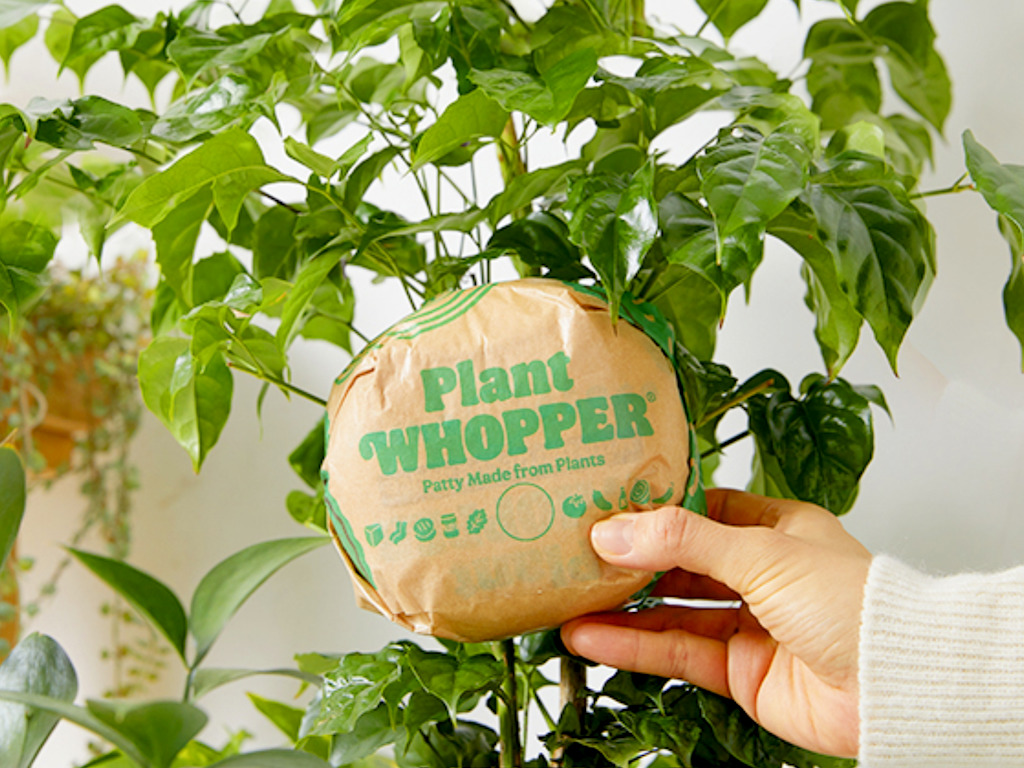3 Mins Read
Burger King Korea has added two new plant-based versions of its famous Whopper to its menu, partnering with Australian food tech v2food to swap out its conventional beef burgers for an animal-free soy-based patty. It will be available across all locations in South Korea, in a move aligned with the fast food franchise’s global push to respond to the mainstream demand for meatless options.
Burger King Korea, which is operated by Hong Kong-based private equity firm Affinity Equity Partners (AEP) who also runs the franchise in Japan since 2017, has added two new plant-based Whoppers to its menus across South Korea after teasing the launch in an online countdown on its official website. All 240 locations in the country will now be serving the new “Plant Whopper”, which comes in two formats – regular for ₩5,900 (US$5.32) and BBQ flavour for ₩7,900 (US$7.12).
Partnering with Sydney-based food tech startup v2food, the fast food giant will be using the brand’s plant-based burger patties, which are made primarily from soy protein and natural flavourings, topping it with all the usual ingredients such as lettuce, sliced tomatoes, onion, ketchup and conventional mayonnaise, which is suitable for vegetarians but not vegans.
In a review posted online by one blogger who went to try the new Plant Whoppers on the day of the launch, the meatless patties were described as bearing “95% resemblance” to their real animal-based counterpart.
It comes shortly after Burger King outlets across the world have begun rolling out plant-based Whoppers, in a strong sign of the pressure that QSR chains under to ramp up their meatless offerings in line with global consumer trends. Burger King pioneered partnerships with alternative protein firms back in August 2019 when it debuted the Impossible Foods Whopper across U.S. locations, and has since launched plant-based options in collaboration with Unilever subsidiary The Vegetarian Butcher in Europe and mainland China.
Juhang Jimmy Sohn, the Korean partner at Bright Green Partners, a plant and cell tech strategy firm, told Green Queen in a statement that he had high hopes for the new burger. “As one of the very few Korean alt meat consultants, I hope the BK Korea’s Plant Whopper launching can be successful, unlike other Korean QSRs’ plant-based hamburger menus. When Beyond Burger was introduced in Korea, it was not that popular because the price was expensive and little bit too much herb flavour was not attractive, even to the Korean vegan communities.”

In Japan and the Philippines, the chain uses v2food’s plant-based patties. The Australian food tech, who recently closed record-breaking US$55 million Series B round, also produces the plant-based Rebel Whopper at Burger King-franchise Hungry Jack’s across Australia, and at Burger King locations in New Zealand.
With flexitarian and plant-based eating trending globally, a pattern that Unilever CEO Alan Jope has described as “inexorable”, other QSR giants have too made strides in launching new plant-based offerings to keep up with the demand.

KFC has partnered with Beyond Meat, Quorn, & Lightlife as part of its plan to become a “restaurant of the future”, while Pizza Hut collaborated with Beyond Meat to bring plant-based meat pizzas across the U.S and Starbucks debuted the Impossible breakfast sausage both in Hong Kong and the U.S.
McDonald’s has taken it a step further following its new vegetarian breakfast menu made with OmniPork Luncheon in Hong Kong and Macau, revealing that it has now developed its own-brand meatless line called McPlant, which food tech giant Beyond Meat claims it was a co-creator. The new McPlant burgers are now being trialled in Denmark and Sweden, before a wider roll-out in other markets.
Lead image courtesy of Burger King Korea.




